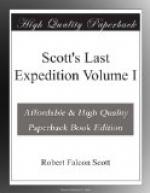The Beardmore Glacier is not difficult in fine weather, but on our return we did not get a single completely fine day; this with a sick companion enormously increased our anxieties.
As I have said elsewhere we got into frightfully rough ice and Edgar Evans received a concussion of the brain—he died a natural death, but left us a shaken party with the season unduly advanced.
But all the facts above enumerated were as nothing to the surprise which awaited us on the Barrier. I maintain that our arrangements for returning were quite adequate, and that no one in the world would have expected the temperatures and surfaces which we encountered at this time of the year. On the summit in lat. 85 deg. 86 deg. we had -20 deg., -30 deg.. On the Barrier in lat. 82 deg., 10,000 feet lower, we had -30 deg. in the day, -47 deg. at night pretty regularly, with continuous head wind during our day marches. It is clear that these circumstances come on very suddenly, and our wreck is certainly due to this sudden advent of severe weather, which does not seem to have any satisfactory cause. I do not think human beings ever came through such a month as we have come through, and we should have got through in spite of the weather but for the sickening of a second companion, Captain Oates, and a shortage of fuel in our depots for which I cannot account, and finally, but for the storm which has fallen on us within 11 miles of the depot at which we hoped to secure our final supplies. Surely misfortune could scarcely have exceeded this last blow. We arrived within 11 miles of our old One Ton Camp with fuel for one last meal and food for two days. For four days we have been unable to leave the tent—the gale howling about us. We are weak, writing is difficult, but for my own sake I do not regret this journey, which has shown that Englishmen can endure hardships, help one another, and meet death with as great a fortitude as ever in the past. We took risks, we knew we took them; things have come out against us, and therefore we have no cause for complaint, but bow to the will of Providence, determined still to do our best to the last. But if we have been willing to give our lives to this enterprise, which is for the honour of our country, I appeal to our countrymen to see that those who depend on us are properly cared for.
Had we lived, I should have had a tale to tell of the hardihood, endurance, and courage of my companions which would have stirred the heart of every Englishman. These rough notes and our dead bodies must tell the tale, but surely, surely, a great rich country like ours will see that those who are dependent on us are properly provided for.
R. SCOTT.
APPENDIX
Note 1, p. 3.—Dogs. These included thirty-three sledging dogs and a collie bitch, ‘Lassie.’ The thirty-three, all Siberian dogs excepting the Esquimaux ‘Peary’ and ‘Borup,’ were collected by Mr. Meares, who drove them across Siberia to Vladivostok with the help of the dog-driver Demetri Gerof, whom he had engaged for the expedition. From Vladivostok, where he was joined by Lieutenant Wilfred Bruce, he brought them by steamer to Sydney, and thence to Lyttelton.




